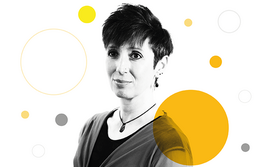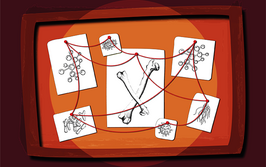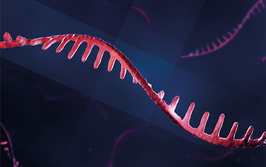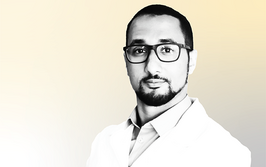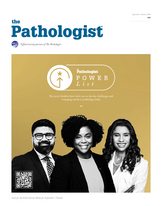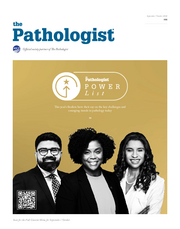Why Did I Choose Toxicology?
Five toxicologic pathologists offer their perspectives on the benefits and challenges of forging a career in toxicology.
David Vearrier, Naren Gunja, Jeffrey Brent, Schantel Hayes, Peter Hall |
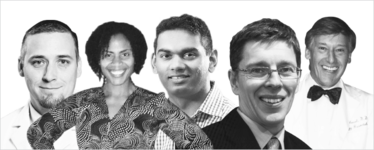
What inspired you to specialize in toxicology?
Peter Hall: One of my driving passions in life has been biology, and more specifically, the mechanisms that underlie biological processes – whether as a schoolboy learning about DNA replication and transcription, or as an undergraduate learning about the pathogenesis of Cushing’s disease in dogs. What continues to attract me is an underlying curiosity to delve into the mechanisms of disease, which as a toxicologic pathologist, manifests as drug-induced toxicity and efficacy. Understanding how cells work, and how they respond in health and disease has never ceased to fascinate me and (I hope) will continue to surprise me.
Schantel Hayes: After two years of “ologies” (pathology, toxicology, pharmacology, etc.) in veterinary school, I moved into the clinic. Many find this the most exciting part – to don the “white coat” and perform surgery. But my interest in veterinary medicine was waning, and I decided medical school best suited my needs. One of my favorite professors was baffled, and suggested comparative pathology. I took his advice and completed a joint anatomic residency/PhD program, then sought a career that encompassed my veterinary training and my newly acquired molecular training.
Jeffrey Brent: As a young resident in emergency medicine, I found poisoned patients to be truly fascinating from both a clinical and a mechanistic point of view. Clinically, a lot of them were very ill, yet unlike other seriously sick patients, they were often relatively young and free of multiple underlying morbidities, and if given the right treatment, they tended to survive.
Naren Gunja: I had a strong interest in chemistry, pharmacology and the mechanisms by which small molecules can cause harm and this led me to further study in toxicology. As a teenager, I read many a crime novel and Agatha Christie was my favorite author. It manifests today in my continued work in forensic toxicology, which I find to be the most inspiring.
David Vearrier: When I finished my residency in emergency medicine, I realized that although I love the field, I wasn’t sure that solely working clinically in an emergency department would provide me with the stimulation and enjoyment to build a rewarding career. The institution where I did my residency had a strong presence in medical toxicology, with internationally renowned doctors, and the residents received extensive exposure to toxicology – coupled with my need to find a challenging sub-specialty, the decision to complete a fellowship in medical toxicology came naturally.
What do you like most about your job?
PH: Without a doubt, the successful registration of new oncology drugs onto the market, and the knowledge that in some small way, I have contributed to the health and well-being of people throughout the world.
SH: The diversity of working with a contract research organization, such as Charles River, gives me the unique option to work in various pathology subspecialties. I have the opportunity to work in discovery, safety assessment, investigative pathology and comparative pathology, where I subspecialize in evaluating genetically engineered mouse models at different ages, with a particular interest in in utero development and molecular pathology.
JB: Physiologically, witnessing the effects of chemically-induced perturbations on organ systems is an unparalleled opportunity – there is no other way of seeing the effects of high-dose chemical exposure on humans. I enjoy intensive care medicine, and many of the patients I see have unique physiological effects that require unique interventions.
NG: It is a multi-faceted specialty and I work as a clinician, researcher and educator in my various roles as toxicologist. I enjoy the holistic approach to patient care, including psychosocial factors; furthermore, medical toxicology is not restricted to a single organ or body system. The most rewarding aspect involves being a bit of a sleuth and trying to work out what poison could cause the scenario presented to me at any given point.
DV: Medical toxicology offers the opportunity to help people when they need it most. We help people with self-injurious ingestions or exposures (e.g. suicide attempts or gestures) recover from their poisoning. We help small children who have been inadvertently poisoned through exploratory ingestions and those who were intentionally poisoned by adults. We help adults and children with adverse reactions to medications, iatrogenic poisonings, and chronic overdoses. We also serve as public health advocates: we are the unbiased source of information and recommendations regarding potential health hazards associated with substances and exposures.
What are the most challenging aspects of the role?
PH: Uncovering the relevance and mechanisms behind unexpected drug-induced toxicity. When I first began as a toxicologic pathologist, toxicity was largely an observational science, where drug-induced changes were recorded and cataloged, whereas today, the aim is to understand whether the same changes are on-target (i.e. effecting the intended biological target), off-target (i.e. affecting a receptor or pathway other than the intended target), or because of some other mechanism. The aim is to move to the next phase of drug development: predicting drug-induced toxicity based on the structure and expected properties of the molecule alone. I think this will make the next 10 years or so both rewarding and challenging!
SH: Being able to switch between our support to the National Toxicology Program and a variety of commercial projects (discovery and safety assessment) can be quite challenging as our clients’ requirements can vary. They may need different levels of pathology support which may include study design and/or be at different stages of test article development (proof-of-concept, efficacy and dose range exploration studies). However, these parts of my job are also the ones I enjoy most.
JB: It is important to be sure that other physicians on the treatment team do not make errors, such as attempting to treat toxin-induced seizures with phenytoin. It can also be disheartening that some patients are hospitalized because of self-harm attempts, are successfully treated, but will later return for the same reason.
NG: Bringing evidence-based practice into toxicology is a challenging but important part of the developing specialty. So too are professional accreditation and recognition of a less prominent field of medicine. Also, keeping up to date with new drugs and chemicals coming to the market, both licit and illicit, is always a challenge.
DV: As a toxicologist you may need to examine a problem through one or more of many different lenses: molecular/macromolecular homology, structure-activity relationships, toxicogenetics/toxicogenomics, consideration of populations at risk, causal inference, the list goes on... The breadth and depth of toxicology is incredible.
David Vearrier (DV) is assistant professor and program director of the Medical Toxicology Fellowship at Drexel University, USA.
Naren Gunja (NG) is associate professor of emergency medicine at Westmead Clinical School, Australia.
Jeffrey Brent (JB) is distinguished clinical professor of medicine at the University of Colorado, USA.
Schantel Hayes (SH) is a veterinary toxicologic pathologist at Charles River Laboratories, USA.
Peter Hall (PH) is a toxicologic pathologist at AstraZeneca, UK.


